SAS Rogue Heroes stuntman recalls desert heatpublished at 06:15 BST 28 October 2022
Olly Lloyd, from Gloucester, was in a team filming in Morocco on the BBC show, battling sandstorms.
Read MoreNigeria president plays down terror warnings by US
US orders diplomats to leave Nigerian capital for safety
'Fake Mr Bean' delights Zimbabwe and Pakistan
New Lesotho PM promises radical reform at swearing-in
Trailblazing Egyptian author Bahaa Taher dies
Thousands flee Togo homes as Islamist threat spreads
Mnangagwa confirmed as Zanu-PF election candidate
Malawi arrests 33 people at anti-corruption protests
Aid ambulance driver killed in Ethiopia
WHO calls for 'urgent' Tigray access to save lives
Car scam by Zimbabwe officials irks president
Cut corruption to curb Ghana crisis - ex-president
UN votes for Western Sahara talks to resume
Fire consumes a section of Kenya's Mount Longonot
Olly Lloyd, from Gloucester, was in a team filming in Morocco on the BBC show, battling sandstorms.
Read MoreTwo Indians vanished in Nairobi in July. Officials now suspect they were abducted by rogue policemen.
Read MoreWe'll be back on Friday
That is all from the BBC Africa Live team for now. We'll leave you with an automated service until our team returns on Friday morning Nairobi time.
Until then you can find the latest updates on the BBC News website, or listen to our podcasts Africa Today and The Comb.
A reminder of our wise words of the day:
Quote MessageIf the tortoise demands more blood, water is used to dilute it."
A Twi proverb sent by Noble Ohene Gyan in Huni Valley, Ghana
Click here to send us your African proverbs.
And we leave you with this picture that South African artist Sthenjwa Luthuli has just posted on his Instagram account:
Allow Instagram content?
This article contains content provided by Instagram. We ask for your permission before anything is loaded, as they may be using cookies and other technologies. You may want to read Meta’s Instagram cookie policy, external and privacy policy, external before accepting. To view this content choose ‘accept and continue’.
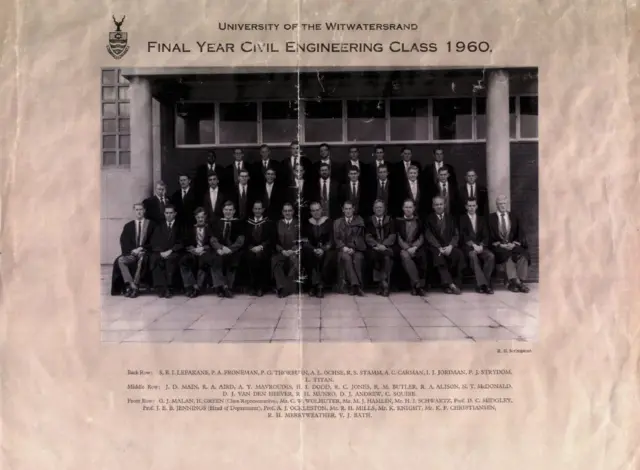 Image source, University of Witwatersrand
Image source, University of WitwatersrandSouth Africa has honoured the country's first black student to graduate with a degree in engineering.
Dr Solomon Boyce Isaac Lefakane studied civil engineering at the University of the Witwatersrand in Johannesburg, and was awarded a degree in 1961 - when the racist apartheid system was in operation.
Now, as part of the university's centenary, Dr Lefakane, now 84, has been inducted into a brand new hall of fame at the Faculty of Engineering and Built Environment.
Dr Lefakane was the son of a domestic worker and gained a scholarship to pursue his studies.
"I knew I was facing very heavy odds at the time and I worked as hard as I could," he told the BBC's Focus on Africa radio programme.
Reflecting on his time there Dr Lefakane said he did not socialise with the white students, but there was a black student residence and "we made our own lives enjoyable".
After graduation he tried to get with Johannesburg City Council but was offered a far smaller salary than his white counterparts. As a result he left South Africa, eventually ending up in the US.
Listen to the interview with Focus on Africa:
Dr Solomon Lefakane graduated from Wits University in 1960 with a Civil Engineering degree
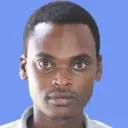 Alfred Lasteck
Alfred Lasteck
BBC News, Dar es Salaam
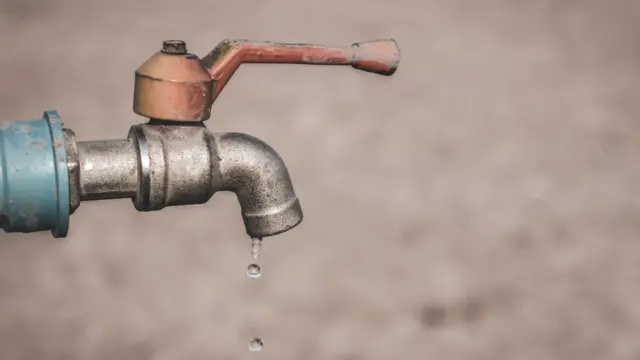 Image source, Getty Images
Image source, Getty ImagesPeople in Dar es Salaam will only get water on alternate days
The authorities in Tanzania on Thursday began rationing water in the commercial capital Dar es Salaam because of a drop in the River Ruvu's levels.
It is dangerously low, leaving the city with a deficit of nearly 166 million litres of water a day.
People in Dar es Salaam will be without piped water for 24 hours on alternate days until the water levels improve.
Dar es Salaam Regional Commissioner Amos Makalla said the water rationing was a result of a prolonged dry spell.
 Will Ross
Will Ross
Africa editor, BBC World Service
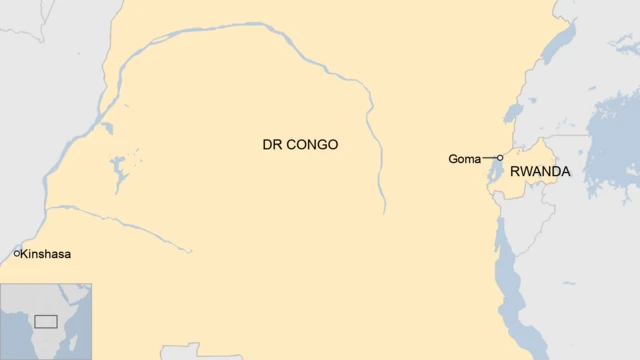
There have been more clashes in the east of the Democratic Republic of Congo between the military and rebels from the M23 group.
The fighting took place on a road linking Goma - the capital of the North Kivu region - with other towns in the east.
At a UN Security Council briefing on Wednesday, the US called on the Rwandan army to stop supporting the rebels.
The government in Kigali has in the past denied any link.
The M23 fighters were pushed out of DR Congo almost a decade ago but resumed fighting late last year - leading to the displacement of tens of thousands of civilians.
 Will Ross
Will Ross
Africa editor, BBC World Service
The Kenyan authorities say five more policemen have been charged over the disappearance of two Indian nationals and their driver.
A total of nine officers have now been detained.
They were all part of a notorious elite unit which President William Ruto recently disbanded.
The unit had been linked to a spate of murders, abductions and incidents of torture.
The Indian victims, Zulfiqar Ahmad Khan and Mohamed Zaid Sami Kidwai, were in Kenya to help with Mr Ruto's election campaign and went missing in July.
What are thought to be the remains of the victims were found in a forest in central Kenya last week.
They have been flown to Nairobi for forensic analysis.
Amber Rudd says a scheme to send asylum seekers to Rwanda is also "impractical" and will not happen.
Read MoreSheriff Tiraspol's Ghanaian defender Patrick Kpozo is in upbeat mood ahead of his club's Europa League clash against Manchester United at Old Trafford.
Read More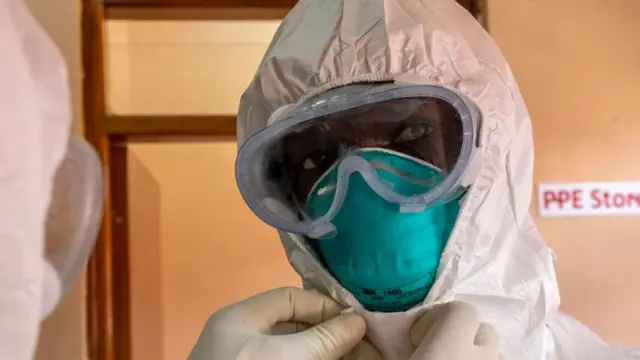 Image source, EPA
Image source, EPAMedics have to dress in protective clothing to treat people with Ebola
Africa's top health body has moved to reassure people that the Ebola outbreak in Uganda is "not getting out of hand".
Ahmed Ogwell Ouma, the acting head of the Africa Centres for Disease Control and Prevention, told journalists that a successful contact-tracing campaign was keeping the spread under control, the Bloomberg news agency reports, external.
Since the outbreak began in September, Uganda's health ministry has recorded 109 cases and 30 deaths.
On Wednesday, it was reported that six children in the same family in the capital, Kampala, had contracted Ebola.
Viruses can spread faster in densely populated areas and this particular strain of Ebola - called the Sudan strain - has no vaccine yet.
Earlier this month the districts at the epicentre of this outbreak, Mubende and Kassanda, were put under quarantine.
Read more:
Peter Mwangangi
BBC Africa business reporter, Nairobi
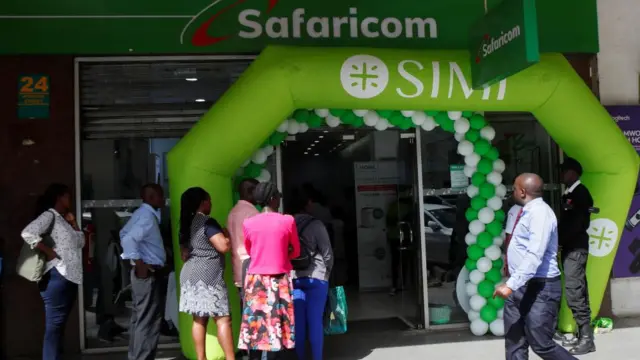 Image source, Reuters
Image source, ReutersEast and central Africa’s largest telecoms firm Safaricom has switched on 5G services in five cities in Kenya, including the capital, Nairobi.
People who can afford it - and the costs are high - could experience data speeds 10 times faster than a 4G connection. For example, if conditions are right, then a whole movie could be downloaded in 10 seconds.
The opening up of 5G is expected to boost the country’s digital economy - e-commerce and the ICT sector in general - which is enjoying a boom in growth.
But to take advantage of it at the moment, customers will either have to buy a 5G router costing around $250 (£210) or invest in a 5G-ready handset. Both options also come with higher data costs.
South Africa, Nigeria, Botswana and Zimbabwe are some of the countries on the continent to have already rolled out 5G.
However, the take-up of 4G is still low in Africa - accounting for just about a quarter of total connections compared to a global average of 60%, according to research by the Global System for Mobile Communications Association.
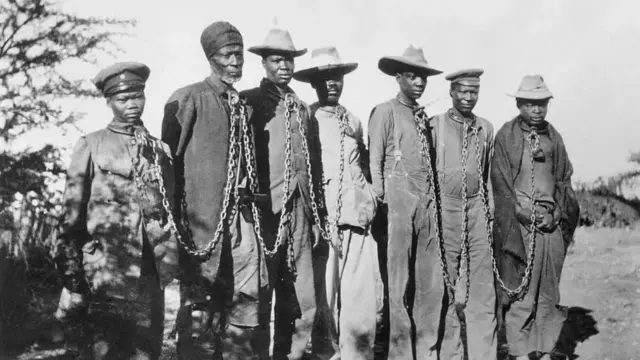 Image source, Getty Images
Image source, Getty ImagesCaptives taken by the Germans were either killed or subjected to appalling brutality
Namibia says it will ask the German government to renegotiate the deal it agreed last year for payment relating to the genocide of the Ovaherero and Nama peoples.
In May 2021, the German government for the first time formally recognised the colonial-era atrocities.
It is estimated that 60,000 Ovaherero, more than 80% of the ethnic group's total population in the region, and 10,000 Nama, 50% of its population, were killed between 1904 and 1908.
Germany announced financial aid worth over €1bn ($1bn; £870m) to descendants.
But the deal has been criticised by the opposition as flawed. The allegation is that some of the affected communities were not consulted.
Namibian National Assembly’s Vice-President Nangolo Mbumba reportedly said the request to review the deal was made in July following discussions in parliament.
"The government of Namibia is awaiting a response from the German side on what we have proposed," the AFP news agency quoted him as saying on Thursday.
The Namibian newspaper quoted Esther Muinjangue, a deputy minister and head of the National Unity Democratic Organisation (Nudo) party, as saying that she was committed to fighting for justice for the affected people.
She said she intended to raise the matter at a forthcoming conference in Germany next week for a renegotiation of the deal.
“What we are saying is that the process was not fair, because members of the affected communities were not represented. So, what we are saying is start the process again, because it is not something new,” she is quoted as saying.
Read more on this story:
The attack on eight women led to violent protests and threats against undocumented immigrants.
Read More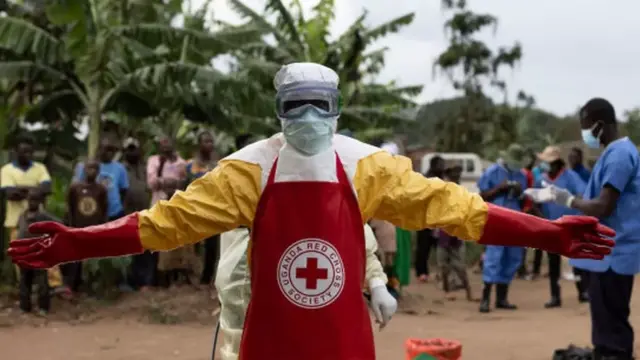 Image source, Getty Images
Image source, Getty ImagesThe outbreak began in Mubende, central Uganda, over a month ago
A leading doctor in Uganda has urged people not to try and treat themselves if they are showing any of the symptoms of Ebola.
The call from Samuel Oledo, the president of the Uganda Medical Association, came after six children in the same family in the capital, Kampala, were found to have contracted Ebola.
For weeks medics have been calling for tougher measures to prevent the virus from spreading to the city.
The six siblings got infected after a relative came to stay from one of the country's worst-affected districts, and later died, health authorities confirm.
"Most of our people have a mentality that you can self-medicate... and they haven't understood how catastrophic Ebola is," Dr Oledo told the BBC's Newsday programme.
He added that it was worrying that more cases were showing up in Kampala.
Since the outbreak began in September, Uganda's health ministry has recorded 109 cases and 30 deaths.
Earlier this month the districts at the epicentre of this outbreak, Mubende and Kassanda, were put under quarantine.
The initial symptoms of Ebola can include a sudden fever, intense weakness, muscle pain and a sore throat.
The Senegal squad heading to the World Cup as African champions is so harmonised it is "a family", says QPR goalkeeper Seny Dieng.
Read More BBC World Service
BBC World Service
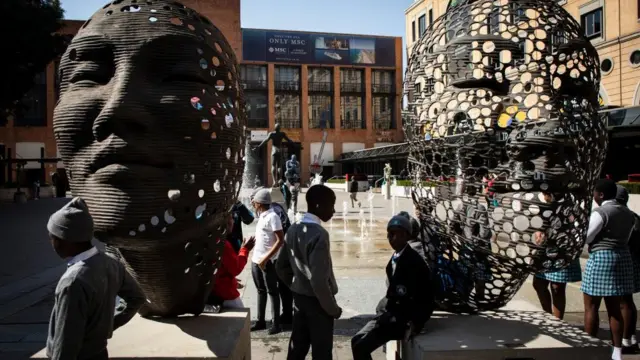 Image source, EPA
Image source, EPASandton is a popular upmarket shopping and business district
South Africa's President Cyril Ramaphosa has described as "unfortunate" a US terror alert for an upmarket area of Johannesburg.
The US warning urged Americans to steer clear of big gatherings. It said the warning affects the suburb of Sandton, and is particularly acute during the coming weekend.
President Ramaphosa said the alert had been issued without any discussion with the South African authorities.
On Tuesday, the US and three other Western countries issued a similar terror alert for Nigeria.
Non-essential diplomatic staff in the capital, Abuja, are being relocated.
The son of Uganda's long-serving President Yoweri Museveni has once again stoked the speculation that he is in line to succeed his father.
Gen Muhoozi Kainerugaba has tweeted that he will "repay [his] great mother" by becoming president.
Allow X content?
This article contains content provided by X. We ask for your permission before anything is loaded, as they may be using cookies and other technologies. You may want to read X’s cookie policy, external and privacy policy, external before accepting. To view this content choose ‘accept and continue’.
Mr Museveni has been in power since 1986 and there are frequent rumours that Gen Kainerugaba is being groomed to follow him.
In May this year, the military man asked on Twitter if people thought he should run for president and earlier this month he wrote, external: "To the Ugandan opposition, after my father, I will defeat you badly in any election. Ugandans love me more than they'll ever love you."
The 48-year-old is no stranger to controversy on Twitter.
At the beginning of October, he threatened in a tweet to invade neighbouring Kenya, prompting a public apology and diplomatic meetings to reaffirm ties.
Then after President Museveni directed that he stops commenting on government affairs on Twitter, Gen Kainerugaba said that "no-one will ban him from anything".
A deadline of 11 November is set for countries to declare interest in hosting the 2025 Africa Cup of Nations.
Read More Will Ross
Will Ross
Africa editor, BBC World Service
Human Rights Watch has called for the Malian security forces, external and UN peacekeepers to offer more protection in the north of the country following dozens of attacks by Islamist militant groups.
It says tens of thousands of people have been displaced over the last eight months in the Ménaka and Gao regions.
Witnesses described a pattern of heavily armed men on motorbikes and in other vehicles surrounding villages, shooting indiscriminately and summarily executing men.
Community leaders say nearly 1,000 people have been killed.
The rights group says fighters linked to the Islamic State group had mainly targeted Tuareg communities that they saw as loyal to former rebel groups now allied to the Malian government.
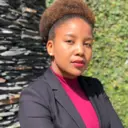 Pumza Fihlani
Pumza Fihlani
BBC News, Johannesburg
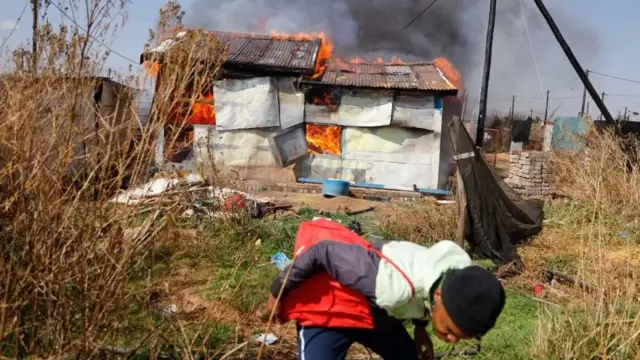 Image source, AFP
Image source, AFPThe homes of people believed to be working in the country illegally were targeted after the mass rape accusation
Fourteen suspects accused of raping and sexually assaulting a group of women in South Africa in July have had those charges dropped.
The National Prosecuting Authority (NPA) said on Thursday that DNA evidence taken from the suspects, described as illegal miners, failed to link them to the crime.
“Upon consultation with the complainants on the matter and evidence at had it became apparent we cannot proceed with prosecution. We have insufficient evidence to continue with the case,” said the NPA’s spokesperson Phindi Louw Mjonondwane.
The suspects were arrested and charged after some of the victims pointed them out as the alleged rapists during a police identity parade.
Eight women had been filming a music video on 30 July near a disused mine outside Johannesburg when they and the film crew were attacked by a large group of men.
Reports of the gang rape by the so-called Zama Zamas, a colloquial term used for illegal miners, led to violent protests by communities in the area where the mine is located.
It also led to xenophobic rhetoric and threats against undocumented immigrants.
Although the group have been cleared on the sexual violence and robbery charges, the NPA says the suspects will still be charged for allegedly contravening immigration laws.
That matter will be heard on 1 November.
The police have meanwhile told the BBC that they will continue investigating the rape cases and intend to bring the attackers to justice.
The dropped charges will be seen by some as an embarrassment to the country’s police and courts, which are often criticised for failing victims of sexual crimes.
South Africa has one of the highest reported cased of sexual violence in the world.
Read more on this story: